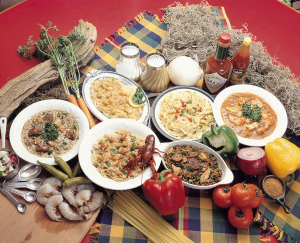
If you’re looking for an authentic taste of New Orleans, you can’t go wrong with a steaming bowl of gumbo. Hailing as Louisiana’s official state food, this savory stew is a staple of Creole cooking and a reflection of its wide range of cultural influences. Gumbo is typically condensed with file powder, a product of the sassafras tree that the indigenous peoples of New Orleans knew to harvest. Africans brought into the city through slave trade introduced okra – the base of this famed dish. However, despite these generally agreed-upon foundational features of the stew, there are about a hundred and one ways to make a gumbo. New Orleans Italians posit gumbo must be made with tomatoes, while French families usually prefer without. Germans often fill their gumbo with sausage, while indigenous peoples use duck, squirrel, or deer.
One Creole’s perfect gumbo may be another’s idea of blasphemy, but this diversity of perspectives and techniques is exactly what makes Creole cooking special. New Orleans’s spicy, vibrant, world-famous culture developed as a direct result of its unique composition of people from all over the world coming together and exchanging ideas. Most Italian immigrants in New Orleans went into the food business, introducing pastas, tomato sauces, and dishes like buttery barbeque shrimp and the olive-laden muffaletta sandwich. French immigrants developed rich, creamy dishes like crawfish etouffee and oysters Bienville, while New Orleans’s Afro-Caribbean immigrant population introduced hot sauce and the staple dish of red beans and rice. While each culture’s influence can be individually recognized in the tradition of Creole cooking, the magic of this cuisine ultimately is in the union of all of these influences. Together the various ingredients and techniques of New Orleans immigrants and indigenous peoples have come together to create something greater than the sum of their parts – the melting pot (or should I say gumbo pot?) of Creole cuisine.
